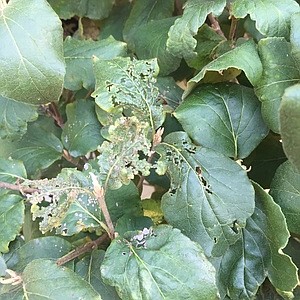Q: I heard organic fertilizer for lawns is good to build soil. My topsoil is thin, over heavy clay. Will it be better?
A: Organic fertilizer will indeed help to build your soil. More will need to be applied, as it is not as nutrient dense as synthetic fertilizer. That extra weight is mostly organic matter and other beneficial traits, just what your soil needs. Once you start on this program, stick with it, as it may take several years for it to improve the soil considerably. Be sure to check what the manufacturer recommends on how much to apply and when. Contact our extension center if you have questions and consider a soil test if you haven't had one done. If your pH is too low, you may need lime; the organic fertilizer won't amend for that.
Q: Some yellow jackets were aggressive this weekend, and I found the hole to their nest in some perennial ground cover. I am unsure if I should kill them or leave them alone as it's going to get cold. Are they considered a beneficial pollinator insect?
A: I've been hearing a lot about that. Wasps and hornets can serve as pollinators, but they're not as important as bees and some flies. Yellow jackets are quite aggressive in the late summer and fall (especially preceding stormy weather), but they can sting at other times. Since they can hurt people and pets, it is best to get rid of them. They are fine in nature where you don't have to engage with them, at least regularly.
Our recommendation for killing them is to pour about a quart of liquid insecticide into the entrance hole of a synthetic pyrethroid class. Permethrin is such an active ingredient, and there are a number of brand names for it. Another commonly available synthetic pyrethroid option is Spectracide Triazide Insect Killer. Be sure to read the label and follow instructions. Mark the hole with something you can find easily at night with a flashlight. Do this when dark. Place a heavy object over the hole after you treat it.
Q: I would like to establish perennial grasses in a somewhat shady area that would require minimum mowing. It is kind of a sloped area and somewhat difficult to get into. I would like to treat with typical lawn herbicides if needed. What might I use?
A: There are several types of grasses recommended for light to moderate shade and dry soil conditions. On a slope with shade makes the location likely dry. They should all tolerate typical lawn herbicides.
To mow less, you should use a type with less aggressive growth, which would include hard fescue, sheep fescue, spreading fescue, slender creeping fescue and Chewing's fescue. You could put together a blend of two or three of these. We have specific varieties recommended in this publication: "Grasses in Shade: Establishing and Maintaining Lawns in Low Light" (extension.missouri.edu/p/G6725).
I have seen a yard maintained where they weed whip it twice a year (June and August); it doesn't look good for a front yard. But, it might work well in this instance, given the area isn't too large.
Q: I have a viburnum that's more than 5 years old on the north side of the house in the suburbs. (There's) a prague viburnum right next to it that is showing no damage.
A: That appears to be insect feeding. It could be a beetle, like Japanese beetles. If the damage occurred some time ago, I'd suspect them. If recent, it is some other insect that has a chewing mouth. Insects often have a preference for a given variety, sometimes even favoring a specific plant.
Cold weather is coming. I'd try to look past the damage and by next spring all will be OK. If the damage is recent and increasing, then spraying it with a broad spectrum insecticide would stop it. Spectracide Triazide Insect Killer would be a reasonable choice and can be found in a "ready to spray" bottle you hook to the end of a hose.

